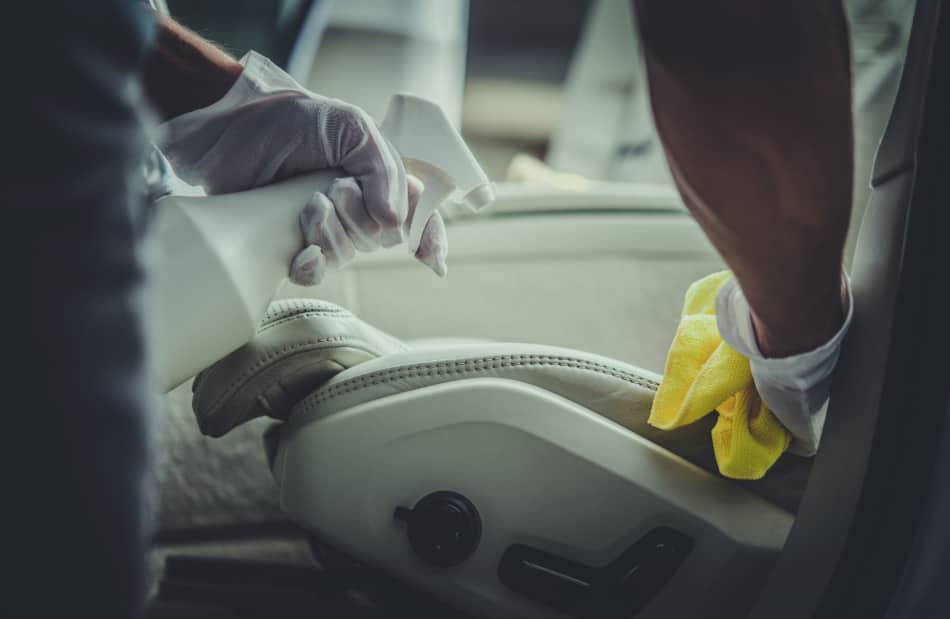Have you ever wondered if Windex can be used on leather car seats? Well, in this article, I will answer this question and also talk about the pros and cons of using Windex on your car’s leather upholstery. I hope to give you all the information needed to make an informed decision! So can you use Windex on leather car seats?
In general, it is not recommended to use Windex on leather car seats because you risk stripping the protective coating and leaving your seat vulnerable. While there are some reports of people successfully applying Windex to their car’s leather upholstery without any negative effects, many others have reported spotting problems afterward.
Keep reading this article to find out the details of why you shouldn’t use Windex on your leather car seats and what you can use instead.
Reasons You Should Not Use Windex On Leather Car Seats
Windex is one of the most effective cleaning products on the market but there are a couple of reasons why using Windex on your leather seats might be a bad idea.
1. Windex Removes The Protective Coating On Leather Car Seats
When you use Windex on your leather car seats, there is a risk of stripping the protective coating and leaving your seat vulnerable to any kind of damage.
As mentioned above, this is one of the main reasons why you do not want to use Windex on your leather car seats or any leather items in general.
Leather car seats are one of the most hardwearing parts of your car as anytime you drive your car, your leather car seats will get used. Due to this, leather meant for use in cars is often coated with protective layers to keep it safe.
This allows the leather car seat to be a lot more resistant to wear and tear making the leather seats last even more than the total life span of the car if properly cared for.
Using Windex as a cleaning or conditioning agent for your leather seats will strip away the protective layer on the leather and make it susceptible to easy damage.
2. Windex Contains Isopropyl Alcohol That Can Dry Out The Leather
Another reason why Windex is not appropriate for your car leather seats is that it contains Isopropyl Alcohol that can dry out the leather.
It’s important to make sure you’re using a cleaner for your car seat that will not damage it or strip away its essential oils, and Windex is one of those cleaners.
Leather as a material contains natural essential oils that help keep it from drying out while maintaining a soft, supple texture that is also healthy-looking.
Leather since it’s natural has natural fibers and it’s those fibers that the natural essential oils lubricate to gives your leather car seats the rich and soft luxurious feel.
But this is where using Windex can be problematic. The cleaning agents in Windex are harsh and will actually strip away those oils and leave the leather feeling dry rather than comfortable to sit on.
And when your leather car seat dries out, it can lead to so many severe damages or leave your leather car seat susceptible to scratches, cracks, peeling, and other damages without the natural protective layer of oil left.
3. Windex Can Discolor Your Car Leather Seats
When you use Windex on your leather car seats it can also cause discoloration due to the chemicals in the detergent.
Although there are ammonia-free Windex products on the markets, most Windex products are formulated with ammonia, ethanol, or ethyl alcohol, and strong cleaners like pine oil, citrus extract, formalin (formaldehyde), and methanol.
It’s important to note that these ingredients are the key culprits which often cause discoloration or peeling when used too frequently.
Ammonia, one of the main ingredients in Windex is particularly dangerous because it has a low boiling point which can lead to serious discoloration, cracks, and peeling in the leather car seats.
Some people use Windex as a way of cleaning their car’s leather seats because it removes stains and gives them an overall cleaner look.
However, this is not beneficial in any sense for you because it will ruin the appearance of your car’s leather items.
4. Windex Made For Non-Porous Surfaces
Heard of the popular saying use the right tool for the right job? The manufacturers of Windex had specific materials for which this product was made.
Windex is a great cleaner for all non-porous surfaces like glass, ceramic tile, granite countertops, metal fixtures, and appliances.
Leather, on the other hand, is a highly porous material and when it is soaked in Windex, it can lead to discoloration and cracking.
Windex’s ammonia content also presents another problem for leather car seats because the low boiling point of this substance means that it evaporates too quickly which causes damage to happen faster.
The last thing you want happening is a mixture of hazardous chemicals attacking your expensive car seat! Wipe down your leather car seats with lukewarm water or upholstery cleaner instead. More on this later!
5. Windex Is Bad For Leather Due To Its Toxic Ingredients
Another reason why Windex is bad for your leather items is that it contains toxic substances that may be harmful to your pets. Furry friends are a part of the family, so you want to be sure that they’re not being exposed to chemicals.
Windex is made with some toxic substances and if your pets lick these off their paws or fur, this can lead them into experiencing toxicity symptoms such as weakness, vomiting, seizures, or even death!
This is because leather items often come into contact with our skin and can be licked or scratched by our pets. If your pet has ingested Windex, they should be seen immediately and taken to the vet!
What Do You Use Instead On Your Leather Car Seats
When you want to clean your leather car seats, it is important that you use a safe product. There are many products on the market made specifically for cleaning leather upholstery and these can be found at any automotive store or department in stores like Wal-Mart.
What you can use instead of using Windex on your leather car seats is a specially made product for cleaning leather or mild soap and warm water mixture.
The way you use this is by mixing about a few drops of mild dish soap with warm water and then blotting it onto the leather car seat.
This is preferable to using Windex because the mixture will not discolor or dry out the leather. It will also not leave any residue or streaks on your leather seats like Windex would, which can be damaging to them in time.
What Do You Use Windex For?
Windex is a common household product, and it can be used for many different tasks outside of cleaning your leather car seats.
For example, you could also use Windex on the interior glass windows of your car to clean them or as an all-purpose cleaner in the kitchen.
- I recommend using Windex as an all-purpose cleaner in kitchens because it is gentler than other chemicals and will not leave streaks when wiping down counters or cabinets.
- You can also use Windex to clean the exterior of your car, such as removing stains from the paint job or cleaning bird droppings off of a window.
- I recommend using Windex to clean the exterior because it is gentle on most porous surfaces and will not cause damage if you accidentally get it on another surface besides what you intended.
- You can also use Windex to remove ice from windows in your home during the winter months. Just spray some Windex onto a towel and wipe down glass surfaces with ease.
- You can also use Windex to clean the screens on your laptop, TV, or phone.
- Windex is also best for glass tables in your home. It will not leave a streaky residue and is gentle on the furniture’s finish.
- You can also use Windex to clean kitchen countertops, but it may cause damage to granite or marble so I recommend using something else if you have those types of surfaces.
- If you have synthetic leather or vinyl, Windex is very effective at removing sticky substances from such surfaces (although do keep in mind that this should only be done with fabrics labeled “durable.”)

